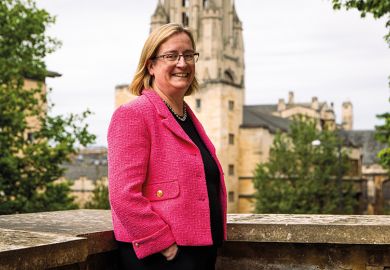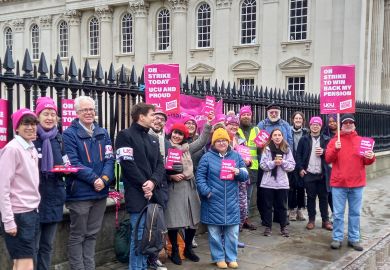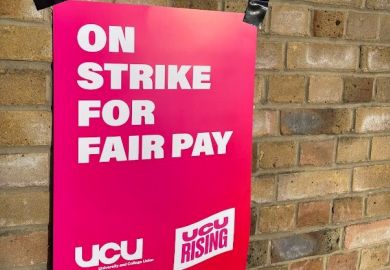The acting vice-chancellor of the University of Cambridge has pleaded with staff to mark students’ work, warning that thousands will not be able to graduate as planned because of industrial action.
In a letter sent to academics on 16 June, Anthony Freeling said the university’s latest estimates were that 50 per cent of its 4,500 undergraduate finalists were likely to be affected by the ongoing marking boycott.
Whole degree programmes – including geography, English and history – had declared that their finalists would not be receiving their degrees this summer, Professor Freeling said.
The “vast majority” of taught postgraduate students who were expecting to graduate in July might not be able to do so, he added, with as many as 90 per cent affected because their subject areas tended to be among those most heavily disrupted.
In a last attempt to break the impasse, he told staff: “Exams are now over for undergraduates. As they relax and celebrate, I realise I need to set out more clearly than ever just how enormous the impact of the boycott is likely to be at Cambridge. Students could still be waiting for degrees well into the next academic year.”
He said progress in the national negotiations on pay and working conditions had “stalled” and there seemed “no prospect of a resolution in time for our students”.
Outlining the consequences for students, Professor Freeling said those who needed degrees for international student visas might not be able to start their programmes on time. It was a similar situation for those who have had job offers starting in July.
He said at least 400 international students would incur costs of close to £1,000 to remain in the UK as they awaited results, with many also at risk of missing out on work opportunities as part of the country’s graduate visa option.
Last month Professor Freeling signed a joint letter with the Cambridge branch of the University and College Union (UCU) urging all sides to restart negotiations to try to resolve the dispute.
Cambridge has also attempted to introduce emergency measures that would have made it easier to award degrees in the current circumstances, but staff rejected these attempts at the governing body, Regent House.
Professor Freeling said this meant Cambridge students were “more severely impacted by the boycott than students at most other universities”, many of which had been able to change internal rules.
Ending the message, Professor Freeling – who will finish his tenure as vice-chancellor when Deborah Prentice takes over next month – said: “I ask you to consider again the impact of your individual choices on the hopes and plans of students whose education and lives have already been so badly affected by the pandemic. Please help them to graduate, which is what they deserve, and the outcome that we all want for our students.”
Reacting to the news, UCU general secretary Jo Grady accused the vice-chancellor of “emotional blackmail” and said he would be “better spending his energy urging his fellow employers to push for a fair resolution so that students across the country can graduate”.
She said the situation at Cambridge was the “tip of the iceberg” of a “national degree scandal” and blamed employer body the Universities and Colleges Employers Association (Ucea) for the situation, which she said was “refusing to restart negotiations”.
Ucea regarded the pay talks as closed after the first part of an uplift of between 5 and 8 per cent was implemented in March, said Raj Jethwa, its chief executive.
“The pay uplift for 2023-24 is at the limits of the sector’s affordability. Anything more would put further jobs at risk and increase workloads for colleagues,” he added.
He said Ucea “remains committed” to negotiations with UCU and the other higher education trade unions on other areas “including the pay spine, use of contract types and improving job security, workload and further reducing the gender, ethnicity and disability pay gaps in the sector”.
“We urge UCU to pause its boycott...and come back to the negotiating table,” Mr Jethwa said.
Register to continue
Why register?
- Registration is free and only takes a moment
- Once registered, you can read 3 articles a month
- Sign up for our newsletter
Subscribe
Or subscribe for unlimited access to:
- Unlimited access to news, views, insights & reviews
- Digital editions
- Digital access to THE’s university and college rankings analysis
Already registered or a current subscriber?








